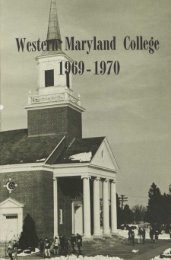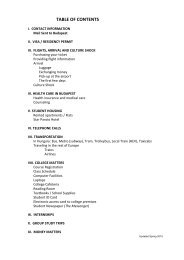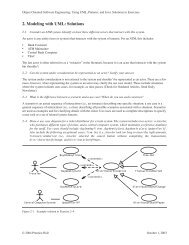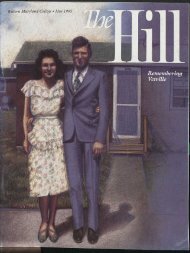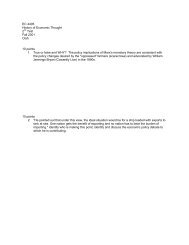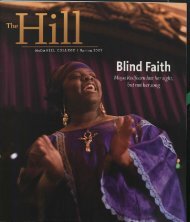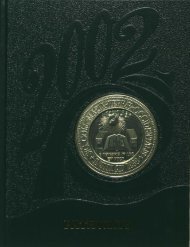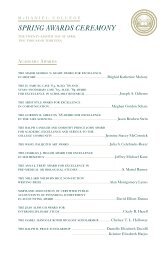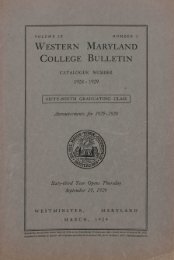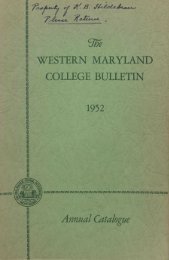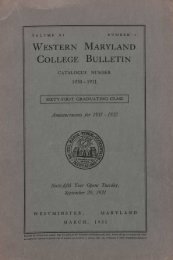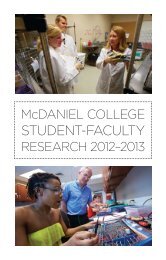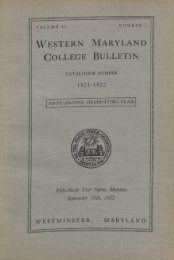The Hill, 2008 - Hoover Library - McDaniel College
The Hill, 2008 - Hoover Library - McDaniel College
The Hill, 2008 - Hoover Library - McDaniel College
You also want an ePaper? Increase the reach of your titles
YUMPU automatically turns print PDFs into web optimized ePapers that Google loves.
carpe<br />
diem<br />
Focus on Africa<br />
Christopher Molam, on the <strong>Hill</strong> this semester as a<br />
visiting Fulbright Scholar-in-Residence from<br />
Cameroon, hopes that by the time he leaves campus<br />
anyone he has met, taught or chatted with<br />
will have a deeper appreciation of the rich diversity<br />
of culture, issues and ideas among Africa's numerous<br />
countries,<br />
He especially hopes to change students' perspectives<br />
through two Courses he's<br />
teaching: Economic Rights and Development<br />
and African Political Economy.<br />
"Students who will be the leaders of<br />
tomorrow need a clearer picture of Africa,"<br />
says Molem, whose expertise is<br />
in African development and political<br />
economies<br />
and globalization.<br />
Molem is chairman of the department<br />
of economics and management<br />
at the University<br />
of Buea in Cameroon,<br />
which he said is the only Englishspeaking<br />
university in the central African<br />
sub-region with about 16,000<br />
students. A typical development economics<br />
class, he said, enrolls about<br />
800 students, and sometimes as many<br />
as 1,150 ~ a huge difference from his<br />
classes at McDanieL Just eight students<br />
are in his Economic Rights and<br />
Development course, for example.<br />
In addition to his teaching duties,<br />
Molem has joined his <strong>McDaniel</strong> host,<br />
Debora Johnson-Ross, associate professor of Political<br />
Science and International Studies, in several<br />
public-speaking engagements. <strong>The</strong> two professors<br />
recently spoke at the Peace and Justice Studies Association<br />
in Portland, Ore. In November, they<br />
planned to present a paper at the African Studies<br />
Association Meeting in Chicago.<br />
Molem worked with Johnson-Ross two years<br />
ago when she spent a year in Cameroon on a Fulbright<br />
grant. This year, she received a Fulbright<br />
Scholarship-in-Residence award to bring him to<br />
<strong>McDaniel</strong>.<br />
His students are as enthusiastic about him as<br />
he is about them. "It started out as Just a class to<br />
take," said Shawn Christianson '11, a political science<br />
major. "But now it has become a personal<br />
interest of mine. He's by far the best professor<br />
l've had." _<br />
Ask the Expert<br />
Is a lightbox an efFective treatment for<br />
Seasonal AfFective Disorder How does<br />
it work<br />
Assist.nt Professor ofPsychololY<br />
M.deUne<br />
Rhodes:<br />
~~:' ~~:~~b:;~A~ i;~~~~ :~: ~~~rr~~a~si:!;e~ ~~rotonin<br />
~ which is involved in regulating mood,<br />
feeding, energy balance and sleep, among other<br />
things ~ is decreased among people who suffer<br />
from SAD. In general, seratonin levels are decreased<br />
during the winter due, at least in part,<br />
to decreased exposure to light because of<br />
shorter days. One nondrug therapy effective<br />
for many is exposure to light ~ simply more<br />
sunlight if possible for mild cases, or a hghtbox<br />
if sun is in short supply or it's a more serious<br />
case. <strong>The</strong>re is a great deal of evidence<br />
that lightboxes can have robust effects to enhance<br />
mood among SAD sufferers and there<br />
are a number of ongoing clinical trials tnvestigatingthiseffect.<br />
<strong>The</strong>re is also evidence that Iightboxes can<br />
work for those of us with subclinical<br />
SAD symptoms.<br />
I am originally from the Gulf Coast of<br />
Texas, but! did my graduate work in Albany,<br />
NY., where it is cold and gray from October<br />
through April. <strong>The</strong> farther you get from the<br />
equator,<br />
the less light you have. So it was a pretty<br />
big adjustment for me. I got a lightbox from the<br />
Sunbox company for my office and used it the<br />
entire time I lived there, from 1999 to 2005. I<br />
could really tell the difference. It is not a trivial<br />
investment, about $300. But then, SAD is<br />
not trivial; it is recognized in the Diagnostic<br />
Statistical Manual as a Major Depressive<br />
Disorder with Seasonal Patterns.<br />
Iplaced the Iightbox near mycomputer ~<br />
you don't have to look directly at it ~ and<br />
turned it on for 15 to 20 minutes first thing<br />
in the morning. I don't know that it helped<br />
me become more of a winter person; Istill<br />
don't like snow or cold. But it certainly did<br />
help with not feeling like Iwas going into hibernation,<br />
which is basically what people<br />
who have SAD are doing, they're sleeping a lot<br />
more and their food intake<br />
increases.<br />
<strong>The</strong> <strong>Hill</strong>




